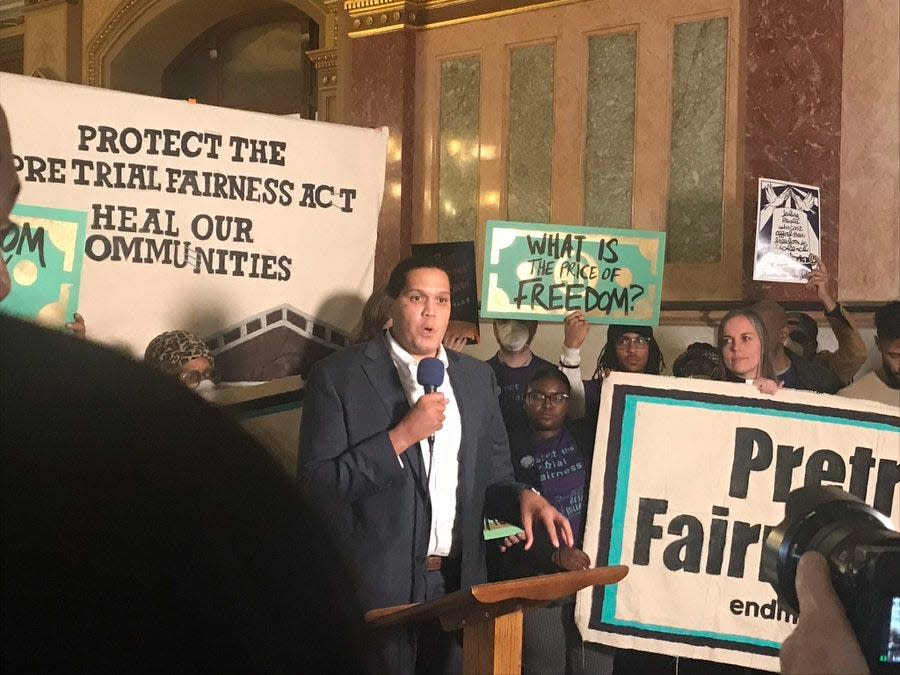Illinois Pretrial Fairness Act ruled unconstitutional
A Kankakee County circuit judge late Wednesday ruled the Pretrial Fairness Act provision of the SAFE-T Act unconstitutional — a win for the group of 60-plus state's attorneys suing the state of Illinois over the criminal justice reform bill.
The provision would have ended cash bail in the state on New Year's Day.
More:Vote on SAFE-T Act amendments hit needed majorities, wins General Assembly passage
In a consolidated case heard in Kankakee County, Judge Thomas W. Cunnington found the act unconstitutional, ruling it violated both the Victim Rights Act and Separation of Powers clause in the Illinois Constitution. Cunnington wrote in his opinion that lawmakers should have instead "submitted the question on the ballot to the electorate at a general election" if they wanted to instill the changes.
The ruling will keep the pretrial provisions and bail reform standards from the 765-page bill from going into effect in the 65 counties which sued, including Sangamon, Tazewell, Fulton, Logan, Knox, Henry and McDonough counties. For the 37 counties not part of the lawsuit, such as Peoria County, Kankakee County State's Attorney Jim Rowe said the changes will go into effect on Sunday.
However, Peoria County State's Attorney Jodi Hoos said Thursday that the county would follow the ruling despite not participating in the lawsuit.
"When a statute is unconstitutional, the statute becomes invalid and has no force or effect on anyone," Hoos said in a statement. "As a result, and until the Illinois Supreme Court provides further clarification, we will abide by this ruling and not implement the new bail reform."
Other provisions of the SAFE-T Act such as new law enforcement training standards and body camera requirements remain intact. Attorney General Kwame Raoul clarified this point in a statement, where most of the provisions have been in effect for more than a year.
Gov. JB Pritzker, along with Raoul, Senate President Don Harmon and House Speaker Emanuel "Chris" Welch were named defendants in the lawsuit and have the ability to appeal the ruling to the Illinois Supreme Court.
Pritzker, who signed the SAFE-T Act in February 2021, called the ruling a "setback" and said he would appeal the ruling.
"The General Assembly and advocates worked to replace an antiquated criminal justice system with a system rooted in equity and fairness," he said in a released statement. "We cannot and should not defend a system that fails to keep people safe by allowing those who are a threat to their community the ability to simply buy their way out of jail."
The partisan makeup of the state Supreme Court — five Democrats, two Republicans — could give a favorable outcome for Pritzker and company. It is unknown at this point when it would hear the appeal from the defendants.
Harmon said on Thursday that they "look forward to the Illinois Supreme Court’s review and more statewide perspective."
RelatedGov. JB Pritzker signs SAFE-T Act amendments into law ahead of cash bail ending Jan. 1
The SAFE-T Act and its subsequent trailer bills were opposed by Republicans in the Illinois General Assembly, most recently during the last day of the veto session and throughout the campaign season.
Those changes, signed into law by Pritzker earlier this month, included changes to the willful flight standard and added several offenses to which a judge could withhold pretrial release if a defendant is danger to the public. Republicans noted that it was progress, but did not favor it overall with no supporting votes.

State Sen. Robert Peters, D-Chicago, led the floor debate on the amendments during the veto session. He said in a statement that he supports the appeal of the Kankakee decision to the Illinois Supreme Court.
“When you make systemic, civil rights level changes, there are bound to be people who will do whatever to stop it. We’ve seen this before from the Voting Rights Act to Obamacare, and even the Governor's COVID-19 mitigations," he said. "We have fought to ensure that all Illinoisans are treated fairly in the criminal justice system and able to exercise their rights under the SAFE-T Act and the Illinois Constitution."
Republicans stood by the decision from the circuit court.
"The Circuit Court ruling which rightly declared it unconstitutional is a win for public safety, and the businesses and residents of Illinois, if upheld by the Illinois Supreme Court," said party chairman Don Tracy in a statement. "For now, it should serve as a message to Governor Pritzker and Democrat legislators that they can’t subvert our constitutional process by ramming their unpopular and dangerous soft-on-crime policies through the legislature in the dark of night.”
Contact Patrick Keck: pkeck@gannett.com, twitter.com/@pkeckreporter.
This article originally appeared on State Journal-Register: Elimination of cash bail ruled unconstitutional by Kankakee County judge

